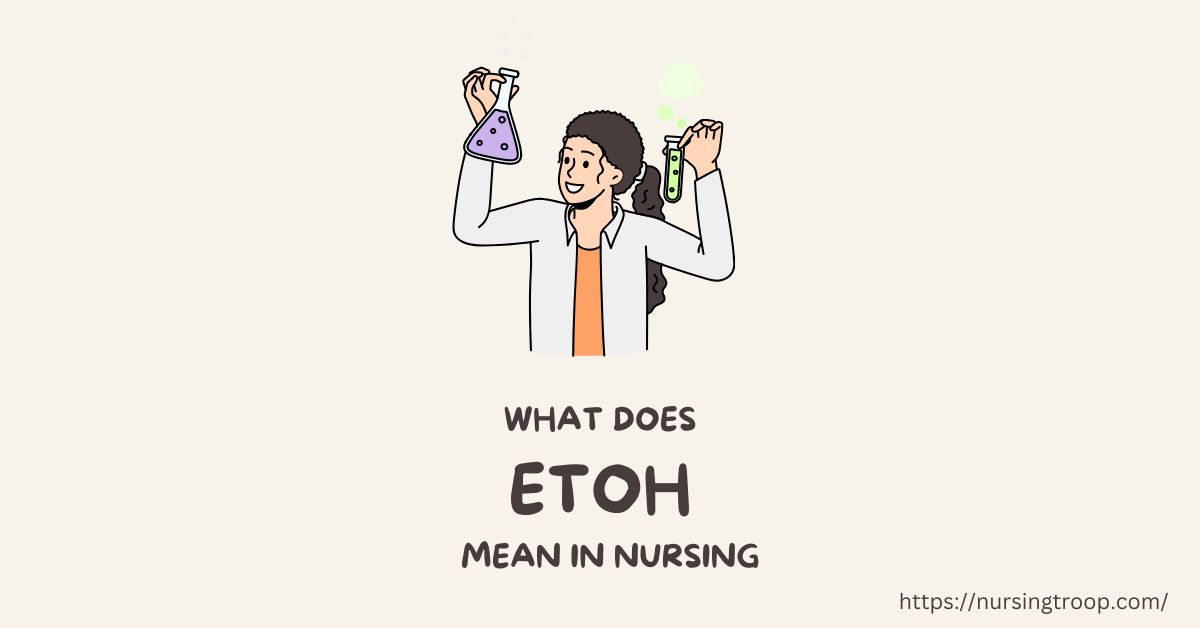As a nurse, you need to understand the many acronyms and abbreviations used in the medical field. One acronym is ETOH. In this post, we will discuss this term in detail.
Table of Contents
What does ETOH Medical Abbreviation Mean?
This stands for “ethanol, or ethyl alcohol,” which is another name for alcohol. It’s important to know what this term means and how it’s used in nursing so that you can provide proper care to your patients.
What is Ethanol?
Ethanol is an organic molecule with two carbon atoms and one oxygen atom. It’s also known as ethyl alcohol or grain alcohol, and it’s a colorless liquid with a characteristic smell and taste. Ethanol is produced by natural processes such as fermentation but can also be synthetically made. When ingested, ethanol acts on the central nervous system and can lead to intoxication if consumed in large enough quantities.
Why is ETOH Used in Nursing?
In nursing, ETOH is commonly used when documenting a patient’s condition or history of alcohol use. For example, if a patient drinks heavily, their chart might include an entry like “ETOH abuse.” This helps nurses quickly identify that the patient has been drinking alcohol excessively and should be monitored accordingly. Similarly, if a patient has recently quit drinking or is trying to reduce their consumption of alcoholic beverages, this will likely be noted.
ETOH is also commonly used when discussing laboratory results related to blood alcohol levels (BAL). In this context, physicians will usually order tests such as an EtG (ethyl glucuronide) test or an ETS (ethyl sulfate) test, which measures the amount of ethanol in the bloodstream at any given time. Knowing these values can help medical professionals better diagnose and treat conditions associated with excessive alcohol use, such as liver disease or acute intoxication.
What are the Effects of Ethyl Alcohol on the Body?
The effects of ethyl alcohol on the body can have a range of short-term and long-term consequences.
Short-Term Effects of Ethyl Alcohol
- Impaired judgment
- Increased risk of accidents due to motor incoordination and slowed reaction times.
- Slurred speech
- Nausea and vomiting
- Memory loss
- Hangover effects the following day
- Increased risk of risky behavior
- Increased risk of developing alcohol dependence.
Long-Term Effects of Ethyl Alcohol
- Damage to vital organs, such as the liver, heart, and pancreas
- Increased risk of developing certain cancers
- Reduced fertility in both men and women
- Developing a dependency on alcohol
- Damage to the nervous system, including memory loss
- Poor nutrition and vitamin deficiencies
- Increased risk of stroke or heart attack.
The effects of ethyl alcohol can be severe, and the risks of drinking alcohol should be considered carefully before deciding to drink. It is important to practice moderation and not exceed the recommended limits for safe alcohol consumption. You must speak to a medical professional if you have any concerns about your drinking habits.
Final Thoughts
ETOH is a vital acronym for nurses since it’s regularly used when documenting a patient’s condition or history of alcohol use. Knowing this term allows nurses to quickly identify if their patients have been drinking excessively or have recently quit drinking so that they can provide appropriate care for them accordingly. With this information, nurses can ensure that their patients receive quality care tailored specifically for them!
Mrs. Marie Brown has been a registered nurse for over 25 years. She began her nursing career at a Level I Trauma Center in downtown Chicago, Illinois. There she worked in the Emergency Department and on the Surgical Intensive Care Unit. After several years, she moved to the Midwest and continued her nursing career in a critical care setting. For the last 10 years of her nursing career, Mrs. Brown worked as a flight nurse with an air ambulance service. During this time, she cared for patients throughout the United States.

